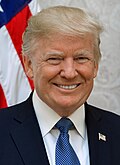| |||||||||||||||||||
| |||||||||||||||||||
| Elections in Arkansas |
|---|
 |
The 2020 Arkansas Republican presidential primary took place on Super Tuesday, March 3, 2020. [2] It used the "Winner takes most" system of allocating delegates. This system states that a candidate must receive 15% of the vote to receive any delegates statewide or by congressional district, but only if the winner gets less than 50% of the aggregate vote. Should they do so, it becomes winner-take-all. [3]

